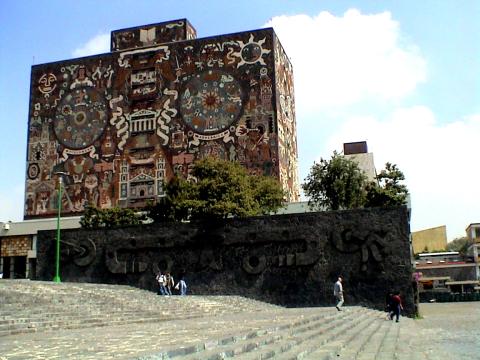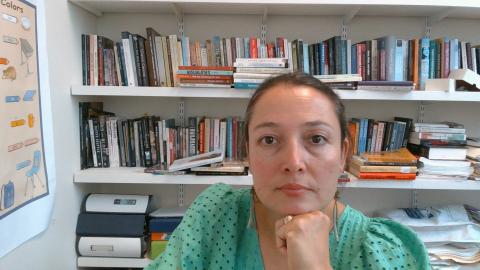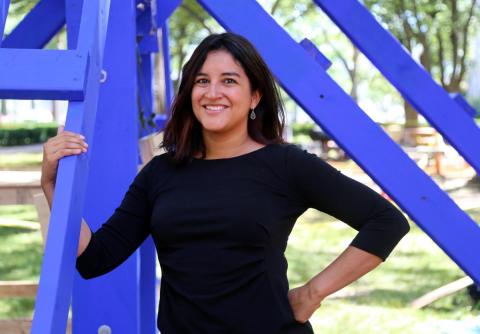See new open access volume edited by Sidore symposium organizers Adam Warren (University of Washington), Julia E. Rodriguez (University of New Hampshire), Stephen T. Casper (Clarkson University, New York)
A public event exploring ethical, collaborative, and reparative aspects of social scientists’ research and teaching and the curated and community spaces they inhabit

The Library of UNAM, Mexico by "hummanna" (built by Juan O'Gorman). This file is licensed under the Creative Commons Attribution 2.0 Generic license
The Library of UNAM, Mexico by "hummanna" (built by Juan O'Gorman). This file is licensed under the Creative Commons Attribution 2.0 Generic license
The Dunfey Endowment for the Study of History was established in 1994 from a generous gift of the estate of William L. Dunfey; the Endowment supports conferences and lecture series on major topics of national and international significance of interest to the UNH History Department faculty, students, and the public.
The Saul O Sidore Memorial Lecture Series was established in 1965 in memory of Saul O Sidore of Manchester, New Hampshire. The purpose of the series is to offer the University community and the state of New Hampshire programs that raise critical and sometimes controversial issues facing our society. The University of New Hampshire Center for the Humanities sponsors the programs. Lectures are free and open to the public.
The UNH Center for the Humanities gratefully acknowledges our organizing partners, the UNH History Department, especially Dr. Julia Rodriguez (UNH), and Dr. Adam Warren (University of Washington) and Dr. Stephen Casper (Clarkson University). We would also like to thank Rachel Nott and Lily Pudlo for invaluable administrative and promotional support.
UNH Land, Water, and Life Acknowledgement
As we all journey on the trail of life, we wish to acknowledge the spiritual and physical connection the Pennacook, Abenaki, and Wabanaki Peoples have maintained to N’dakinna (homeland) and the aki (land), nebi (water), olakwika (flora), and awaasak (fauna) which the University of New Hampshire community is honored to steward today. We also acknowledge the hardships they continue to endure after the loss of unceded homelands and champion the university’s responsibility to foster relationships and opportunities that strengthen the well-being of the Indigenous People who carry forward the traditions of their ancestors.
REGISTER FOR PROGRAMMING ON FRIDAY, MARCH 31!
REGISTER FOR PROGRAMMING ON SATURDAY, APRIL 1!
SCHEDULE AND PRESENTER BIOS (Subject to change)
Day One: Thursday, March 30 (UNH Campus)
4:30–6:00 PM, Strafford Room, MUB
OPENING KEYNOTE: “Encountering Kin, Encountering Truth: Indigenous Archaeology as Restorative Justice” by Dr. Kisha Supernant

Dr. Kisha Supernant
Meet the Indigenous archaeologist who is tracking down missing Indigenous children who were forced from their homes into residential schools, the last of which closed in 1996. Read more about Dr. Supernant at The Indigenous Archaeologist Looking for Residential School Graves in Canada - The New York Times (nytimes.com).
There is no registration required for the Thursday keynote. All are welcome.
Day Two: Friday, March 31 (Browne Center)
8:30–9:00 Coffee & pastries
9:00–9:30 Opening welcomes & remarks
9:30–10:30 "Oyate, Turtle Island, USA: Ethical implications of Representation" by Dr. Kiara Vigil

Kiara M. Vigil (Dakota, Mexican, and white heritage) is an associate professor of American Studies at Amherst College, where she specializes in teaching and research related to Native American history, literature, and culture. She is the author of Indigenous Intellectuals: Sovereignty, Citizenship, and the American Imagination, 1890-1930, published by Cambridge University Press (2015). Her new book, Natives in Transit: Indian Entertainment, Urban Life, and Activism is a cultural history of Native performance and activist networks from the mid-twentieth century, and features the story of her great-grandfather the Dakota actor “Shooting Star.” Most recently, Kiara received a Mellon Foundation “New Directions” Grant to support her foray into learning the Dakota language while working alongside Dakota language experts and teachers to provide new translations of rare Dakota-only texts (like the newspaper “Iapi Oaye”) from the 19th century. These translations and accompanying annotations, as well as, historical and literary analyses, will be publicly accessible in a website for: scholars, language learners, and anyone interested in learning more about the history of Dakota culture, history, linguistics, people, and events.
11:00–12:30 Roundtable 1: Ethical Practices in Research
Panelists: Dr. Christine DeLucia (bio), Dr. Jonathan Sadowsky (bio), Dr. Laura Stark (bio), Dr. Rosanna Dent (bio)
12:30–1:30 Lunch provided for all participants
1:30–3:00 Roundtable 2: Ethical Practices in Teaching
Panelists: Dr. Mishy Lesser (bio), Kristine Malpica, M.A. (bio), Dr. Sebastián Gil-Riaño (bio)
3:00–3:30 Coffee Break
3:30–4:15 Community Roundtable/Teaching Circle led by students from the UNH Civil Discourse Lab
Day Three: Saturday, April 1 (Browne Center)
8:30–9:00 Coffee & pastries
9:00–9:15 Opening welcomes & remarks
9:30-10:30 "When Knowledge Creates Ignorance: Forensic Data and Misidentification in Chile" by Dr. Eden Medina

Eden Medina is Associate Professor of Science, Technology, and Society at MIT. Her research uses the history of science and technology as a way to understand processes of political change, especially in Latin America. She combines history, science and technology studies, and Latin American studies in her writings. She is currently at work on a book project, "The Remains of Dictatorship: Forensic Identification and Error in Chile's Democratic Transition ." See more at Home | Eden Medina (mit.edu).
10:45 am–12:15 Roundtable 3: Ethical Practices in Museums
Panelists: Dr. Alix Martin (bio), Dr. Christopher Heaney (bio), Dr. Sandra Rozental (bio), Dr. Akeia de Barros Gomes (bio)
12:30 –1:30 Lunch provided for all participants
1:30 –3:00 Roundtable 4: Ethical Practices in Communities
Panelists: Dr. Rebecca Pelky (bio), Dr. Araceli Hernández-Laroche (bio), Sandra Kaddy (President, Seacoast African American Cultural Center)
3:00-3:30 Coffee Break
3:30-4:15 Community roundtable/Teaching circle led by Denise Pouliot (bio), the Sag8moskwa (Head Female Speaker) of the Cowasuck Band of the Pennacook-Abenaki People, and Paul Pouliot (bio), Sag8mo (Head Male Speaker/Grand Chief) of the Cowasuck Band of the Pennacook-Abenaki People.